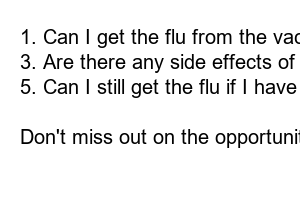독감 인플루엔자 무료 국가예방접종
Title: Get Your Free National Influenza Vaccination Today!
Subheadings:
1. The Importance of Influenza Vaccination
2. Accessing Free National Influenza Vaccination
3. Benefits of Getting Vaccinated
4. Who Should Get Vaccinated?
5. Frequently Asked Questions about Influenza Vaccinations
Influenza, commonly known as the flu, is a contagious respiratory illness that affects millions of people every year. Getting vaccinated against the flu is crucial in preventing its spread and protecting yourself and others from its potentially severe complications. The good news is that the government is offering free national influenza vaccinations to ensure everyone has access to this essential preventive measure.
Accessing Free National Influenza Vaccination:
To make it even easier for individuals to get vaccinated, the government has implemented free national influenza vaccination programs. These programs are designed to remove financial barriers, allowing individuals from all walks of life to avail themselves of this crucial preventative measure. You can find more information about these programs by visiting your local health department or healthcare provider.
Benefits of Getting Vaccinated:
1. Protects You and Your Loved Ones: By getting vaccinated, you greatly reduce the risk of influenza infection for yourself and those around you, including vulnerable populations such as the elderly and young children.
2. Reduces Severity of Illness: Even if you do contract the flu after getting vaccinated, the illness is likely to be much milder and have a shorter duration compared to individuals who are unvaccinated.
3. Prevents Hospitalizations and Complications: Influenza can lead to severe complications, such as pneumonia, bronchitis, and even hospitalization. By getting vaccinated, you reduce the likelihood of these complications.
4. Protects the Community: Vaccination helps create herd immunity, which means that even those who cannot receive the vaccine (such as infants, pregnant women, or individuals with certain medical conditions) are protected indirectly by the reduced spread of the virus in the community.
Who Should Get Vaccinated?
It is recommended that everyone six months of age and older receive a flu vaccine annually. This includes individuals from all backgrounds, occupations, and health conditions. Exceptions may only apply to individuals with severe allergies to vaccine components or those who have had a severe reaction to a previous influenza vaccine. In such cases, it is always best to consult with a healthcare professional.
Frequently Asked Questions about Influenza Vaccinations:
1. Can I get the flu from the vaccine? No, the vaccine contains inactivated or weakened viruses that cannot cause the flu.
2. When is the best time to get vaccinated? It is recommended to get vaccinated before the flu season starts, usually in the fall.
3. Are there any side effects of the vaccine? Common side effects are mild and short-lived, such as soreness or redness at the injection site. Serious side effects are extremely rare.
4. Is the vaccine safe for pregnant women? Yes, pregnant women are at higher risk for severe illness and complications from the flu, making vaccination highly recommended.
5. Can I still get the flu if I have been vaccinated? While the vaccine is highly effective, it is not 100% foolproof. However, if you do get the flu, it is likely to be milder and of shorter duration.
6. Can I get vaccinated if I am allergic to eggs? Most influenza vaccines contain small amounts of egg protein, so it is essential to consult with a healthcare professional to determine the best alternative for you.
Summary:
Don’t miss out on the opportunity to protect yourself and your loved ones from the flu! Take advantage of the free national influenza vaccination programs available to all individuals aged six months and older. Remember, getting vaccinated not only keeps you safe but also contributes to the overall well-being of our communities. Act today and ensure a healthier tomorrow for everyone!

